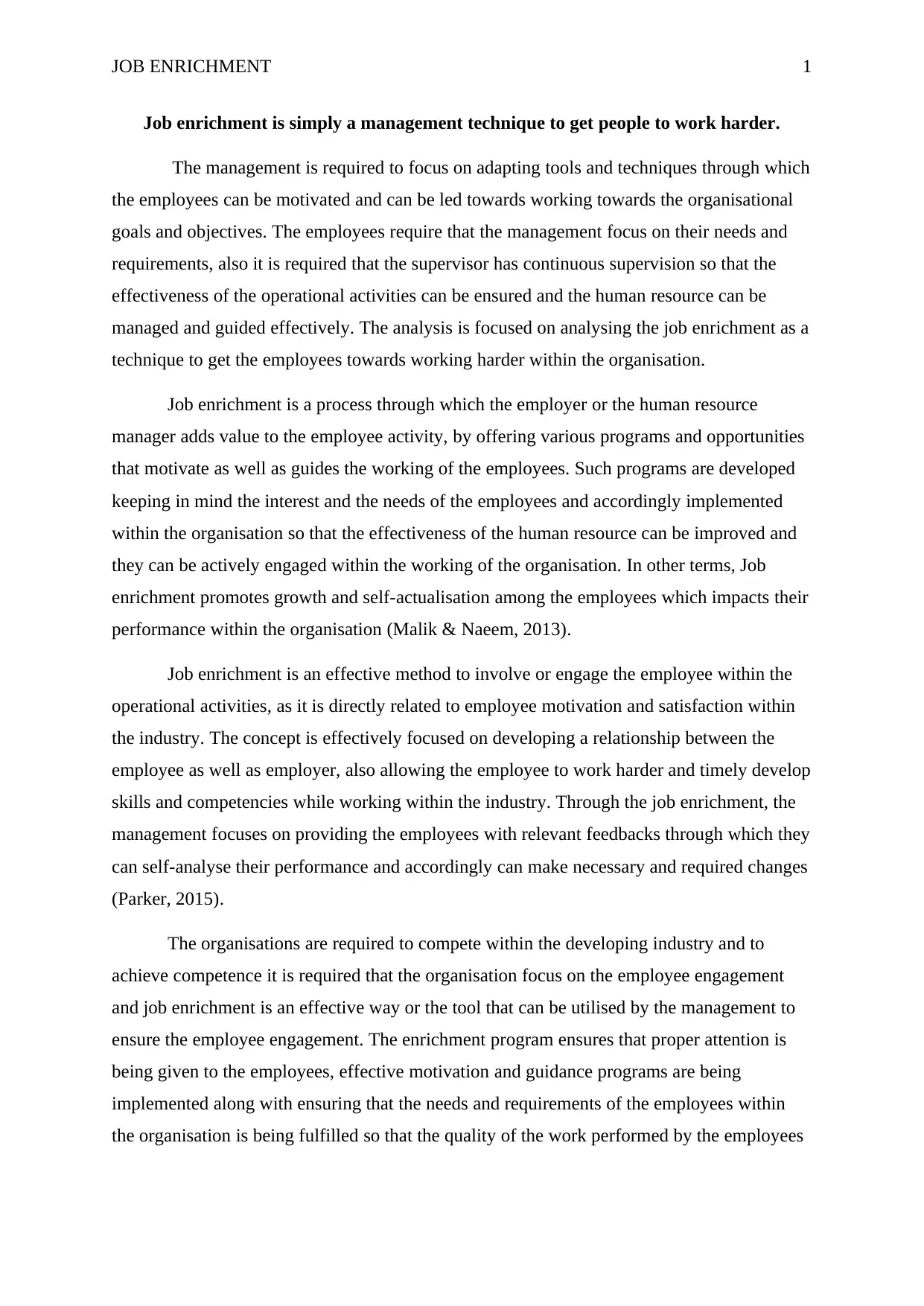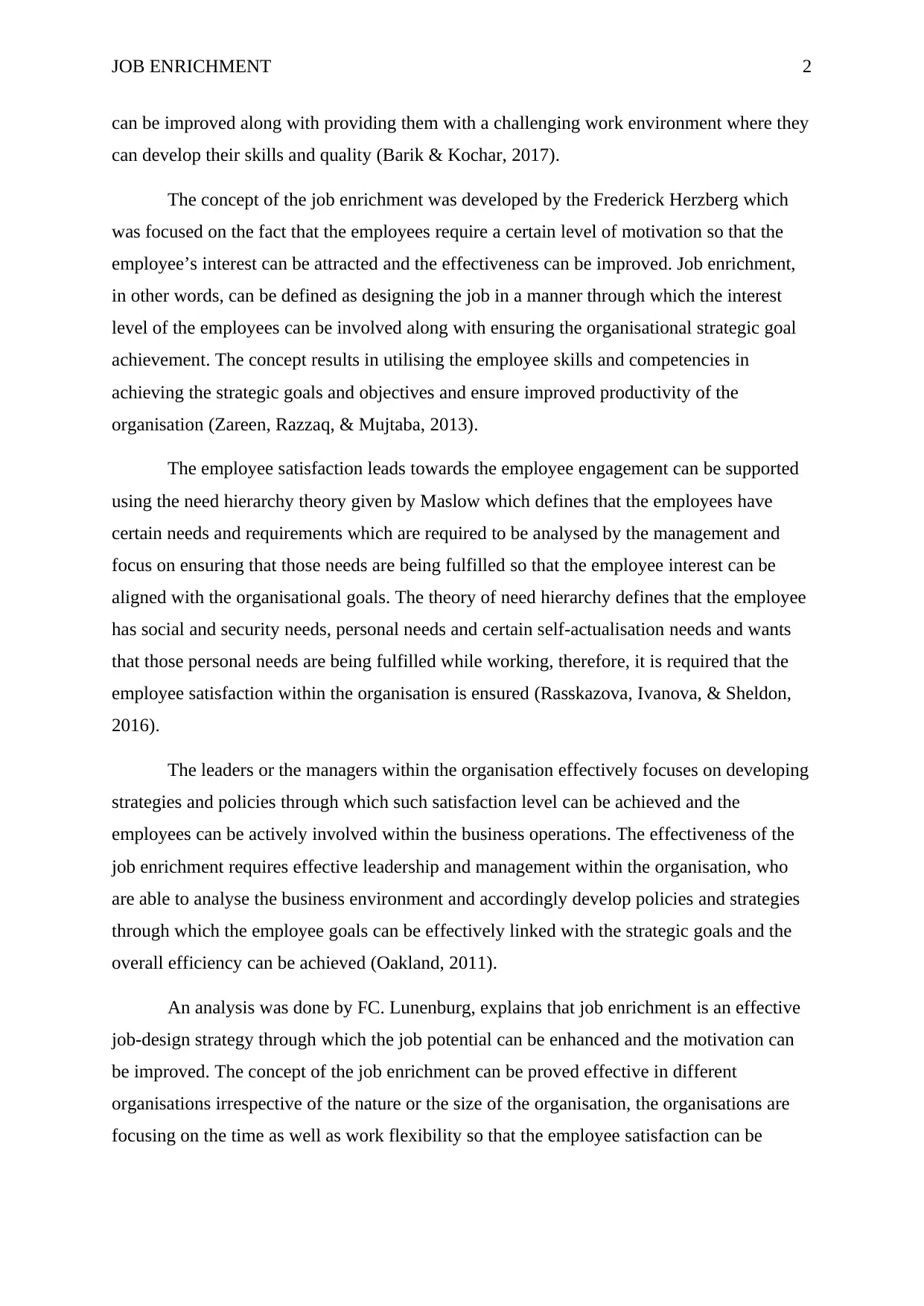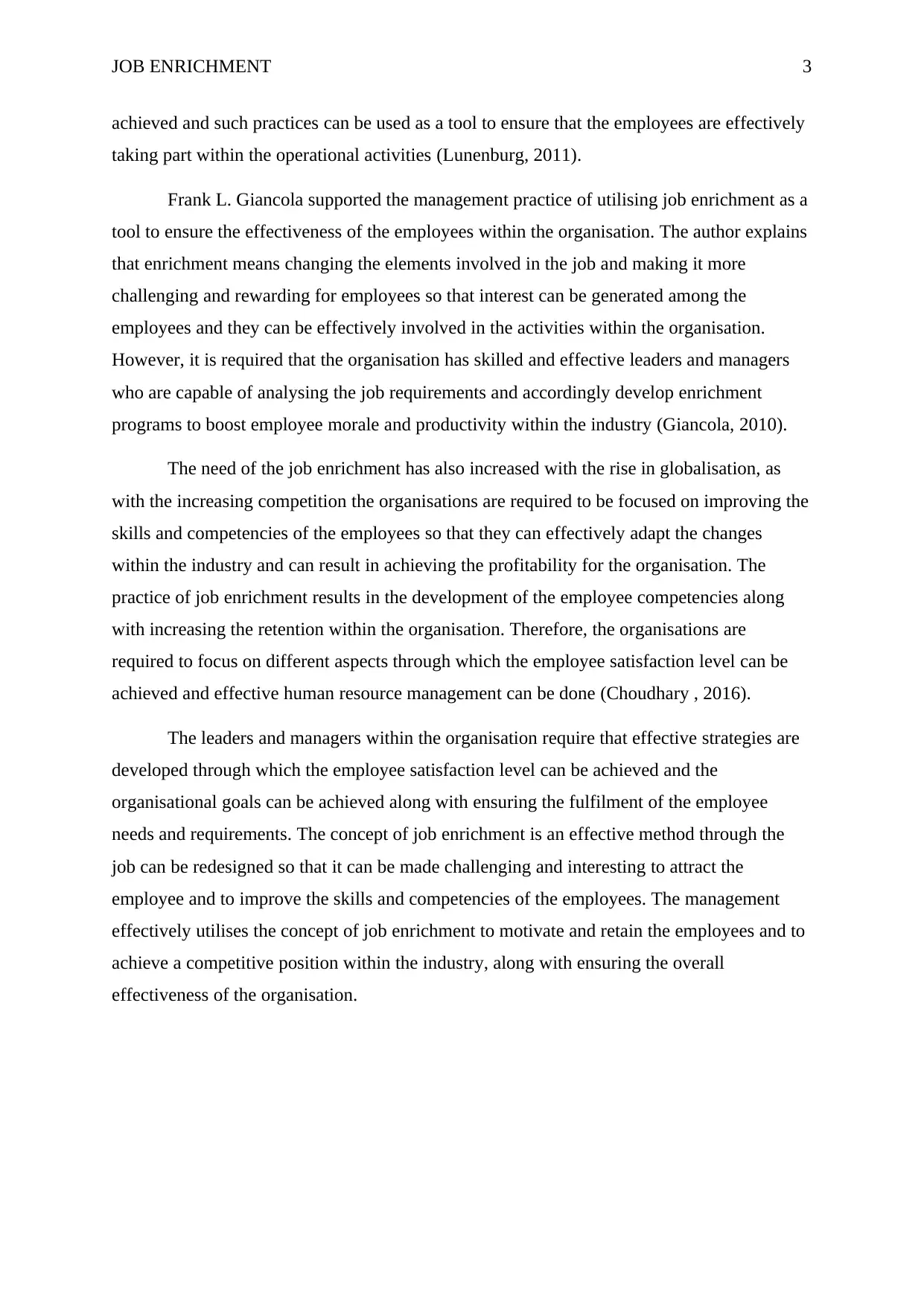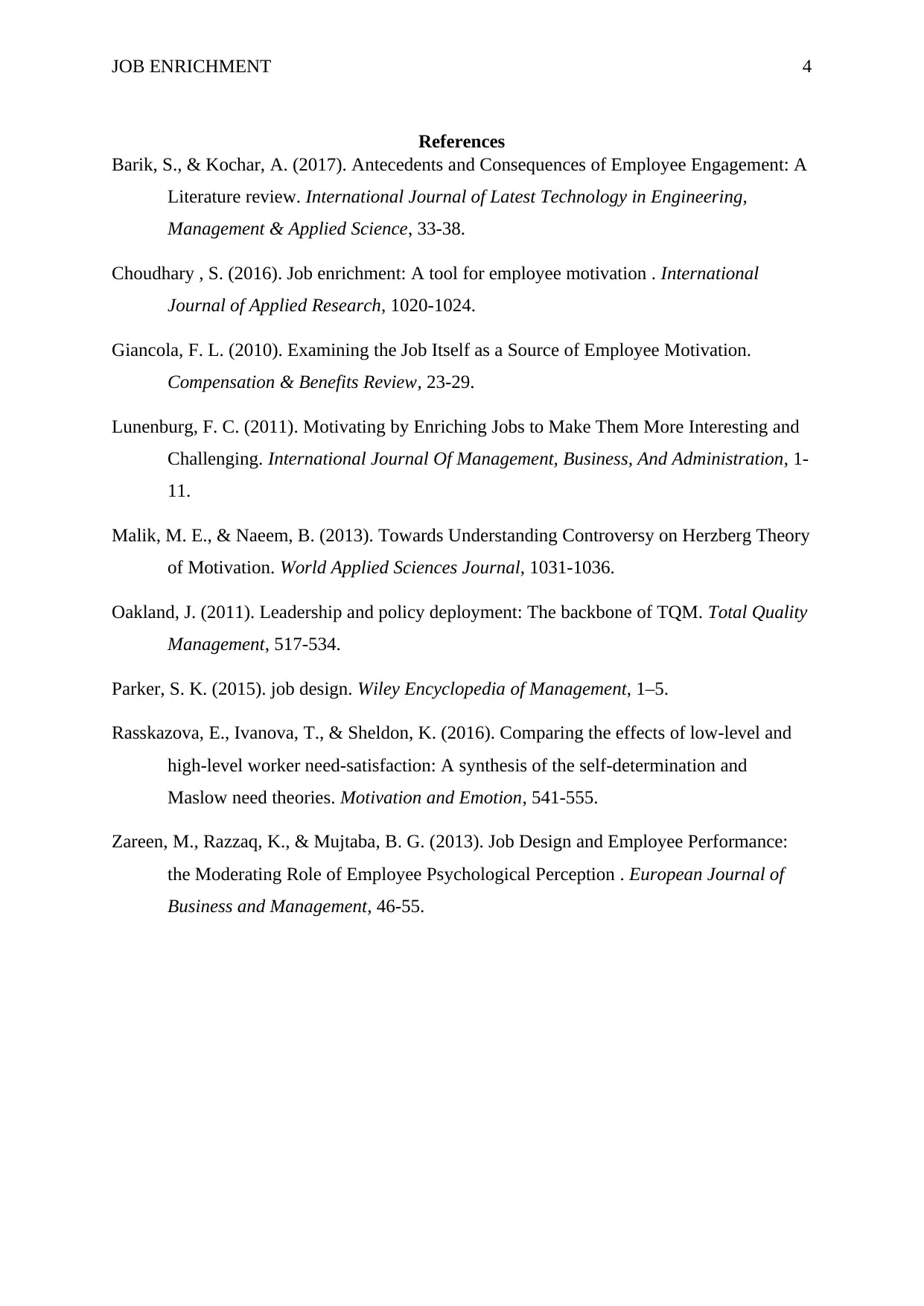Macquarie University MGMT7050: Job Enrichment and Employee Motivation
VerifiedAdded on 2022/09/12
|5
|1509
|40
Essay
AI Summary
This essay delves into job enrichment, a management technique aimed at enhancing employee motivation and productivity. It explores the concept, defining it as a method to add value to employee activities through programs that align with their interests and needs. The analysis covers how job enrichment fosters growth, self-actualization, and improved performance, directly impacting employee engagement and satisfaction. The essay references Herzberg's theory and Maslow's hierarchy of needs to support the importance of employee satisfaction in achieving organizational goals. It also discusses the role of effective leadership and management in implementing job enrichment strategies, emphasizing the need for adaptability in a globalized and competitive industry. Various sources support the idea that job enrichment is a valuable tool for employee retention, skill development, and overall organizational success, making it a key focus for modern management practices. The essay also examines the impact of job enrichment on employee motivation and its role in achieving organizational goals and objectives. The essay provides references to support the arguments and concepts discussed.

Job Enrichment
Student details
1-1-2020
Student details
1-1-2020
Paraphrase This Document
Need a fresh take? Get an instant paraphrase of this document with our AI Paraphraser

JOB ENRICHMENT 1
Job enrichment is simply a management technique to get people to work harder.
The management is required to focus on adapting tools and techniques through which
the employees can be motivated and can be led towards working towards the organisational
goals and objectives. The employees require that the management focus on their needs and
requirements, also it is required that the supervisor has continuous supervision so that the
effectiveness of the operational activities can be ensured and the human resource can be
managed and guided effectively. The analysis is focused on analysing the job enrichment as a
technique to get the employees towards working harder within the organisation.
Job enrichment is a process through which the employer or the human resource
manager adds value to the employee activity, by offering various programs and opportunities
that motivate as well as guides the working of the employees. Such programs are developed
keeping in mind the interest and the needs of the employees and accordingly implemented
within the organisation so that the effectiveness of the human resource can be improved and
they can be actively engaged within the working of the organisation. In other terms, Job
enrichment promotes growth and self-actualisation among the employees which impacts their
performance within the organisation (Malik & Naeem, 2013).
Job enrichment is an effective method to involve or engage the employee within the
operational activities, as it is directly related to employee motivation and satisfaction within
the industry. The concept is effectively focused on developing a relationship between the
employee as well as employer, also allowing the employee to work harder and timely develop
skills and competencies while working within the industry. Through the job enrichment, the
management focuses on providing the employees with relevant feedbacks through which they
can self-analyse their performance and accordingly can make necessary and required changes
(Parker, 2015).
The organisations are required to compete within the developing industry and to
achieve competence it is required that the organisation focus on the employee engagement
and job enrichment is an effective way or the tool that can be utilised by the management to
ensure the employee engagement. The enrichment program ensures that proper attention is
being given to the employees, effective motivation and guidance programs are being
implemented along with ensuring that the needs and requirements of the employees within
the organisation is being fulfilled so that the quality of the work performed by the employees
Job enrichment is simply a management technique to get people to work harder.
The management is required to focus on adapting tools and techniques through which
the employees can be motivated and can be led towards working towards the organisational
goals and objectives. The employees require that the management focus on their needs and
requirements, also it is required that the supervisor has continuous supervision so that the
effectiveness of the operational activities can be ensured and the human resource can be
managed and guided effectively. The analysis is focused on analysing the job enrichment as a
technique to get the employees towards working harder within the organisation.
Job enrichment is a process through which the employer or the human resource
manager adds value to the employee activity, by offering various programs and opportunities
that motivate as well as guides the working of the employees. Such programs are developed
keeping in mind the interest and the needs of the employees and accordingly implemented
within the organisation so that the effectiveness of the human resource can be improved and
they can be actively engaged within the working of the organisation. In other terms, Job
enrichment promotes growth and self-actualisation among the employees which impacts their
performance within the organisation (Malik & Naeem, 2013).
Job enrichment is an effective method to involve or engage the employee within the
operational activities, as it is directly related to employee motivation and satisfaction within
the industry. The concept is effectively focused on developing a relationship between the
employee as well as employer, also allowing the employee to work harder and timely develop
skills and competencies while working within the industry. Through the job enrichment, the
management focuses on providing the employees with relevant feedbacks through which they
can self-analyse their performance and accordingly can make necessary and required changes
(Parker, 2015).
The organisations are required to compete within the developing industry and to
achieve competence it is required that the organisation focus on the employee engagement
and job enrichment is an effective way or the tool that can be utilised by the management to
ensure the employee engagement. The enrichment program ensures that proper attention is
being given to the employees, effective motivation and guidance programs are being
implemented along with ensuring that the needs and requirements of the employees within
the organisation is being fulfilled so that the quality of the work performed by the employees

JOB ENRICHMENT 2
can be improved along with providing them with a challenging work environment where they
can develop their skills and quality (Barik & Kochar, 2017).
The concept of the job enrichment was developed by the Frederick Herzberg which
was focused on the fact that the employees require a certain level of motivation so that the
employee’s interest can be attracted and the effectiveness can be improved. Job enrichment,
in other words, can be defined as designing the job in a manner through which the interest
level of the employees can be involved along with ensuring the organisational strategic goal
achievement. The concept results in utilising the employee skills and competencies in
achieving the strategic goals and objectives and ensure improved productivity of the
organisation (Zareen, Razzaq, & Mujtaba, 2013).
The employee satisfaction leads towards the employee engagement can be supported
using the need hierarchy theory given by Maslow which defines that the employees have
certain needs and requirements which are required to be analysed by the management and
focus on ensuring that those needs are being fulfilled so that the employee interest can be
aligned with the organisational goals. The theory of need hierarchy defines that the employee
has social and security needs, personal needs and certain self-actualisation needs and wants
that those personal needs are being fulfilled while working, therefore, it is required that the
employee satisfaction within the organisation is ensured (Rasskazova, Ivanova, & Sheldon,
2016).
The leaders or the managers within the organisation effectively focuses on developing
strategies and policies through which such satisfaction level can be achieved and the
employees can be actively involved within the business operations. The effectiveness of the
job enrichment requires effective leadership and management within the organisation, who
are able to analyse the business environment and accordingly develop policies and strategies
through which the employee goals can be effectively linked with the strategic goals and the
overall efficiency can be achieved (Oakland, 2011).
An analysis was done by FC. Lunenburg, explains that job enrichment is an effective
job-design strategy through which the job potential can be enhanced and the motivation can
be improved. The concept of the job enrichment can be proved effective in different
organisations irrespective of the nature or the size of the organisation, the organisations are
focusing on the time as well as work flexibility so that the employee satisfaction can be
can be improved along with providing them with a challenging work environment where they
can develop their skills and quality (Barik & Kochar, 2017).
The concept of the job enrichment was developed by the Frederick Herzberg which
was focused on the fact that the employees require a certain level of motivation so that the
employee’s interest can be attracted and the effectiveness can be improved. Job enrichment,
in other words, can be defined as designing the job in a manner through which the interest
level of the employees can be involved along with ensuring the organisational strategic goal
achievement. The concept results in utilising the employee skills and competencies in
achieving the strategic goals and objectives and ensure improved productivity of the
organisation (Zareen, Razzaq, & Mujtaba, 2013).
The employee satisfaction leads towards the employee engagement can be supported
using the need hierarchy theory given by Maslow which defines that the employees have
certain needs and requirements which are required to be analysed by the management and
focus on ensuring that those needs are being fulfilled so that the employee interest can be
aligned with the organisational goals. The theory of need hierarchy defines that the employee
has social and security needs, personal needs and certain self-actualisation needs and wants
that those personal needs are being fulfilled while working, therefore, it is required that the
employee satisfaction within the organisation is ensured (Rasskazova, Ivanova, & Sheldon,
2016).
The leaders or the managers within the organisation effectively focuses on developing
strategies and policies through which such satisfaction level can be achieved and the
employees can be actively involved within the business operations. The effectiveness of the
job enrichment requires effective leadership and management within the organisation, who
are able to analyse the business environment and accordingly develop policies and strategies
through which the employee goals can be effectively linked with the strategic goals and the
overall efficiency can be achieved (Oakland, 2011).
An analysis was done by FC. Lunenburg, explains that job enrichment is an effective
job-design strategy through which the job potential can be enhanced and the motivation can
be improved. The concept of the job enrichment can be proved effective in different
organisations irrespective of the nature or the size of the organisation, the organisations are
focusing on the time as well as work flexibility so that the employee satisfaction can be
⊘ This is a preview!⊘
Do you want full access?
Subscribe today to unlock all pages.

Trusted by 1+ million students worldwide

JOB ENRICHMENT 3
achieved and such practices can be used as a tool to ensure that the employees are effectively
taking part within the operational activities (Lunenburg, 2011).
Frank L. Giancola supported the management practice of utilising job enrichment as a
tool to ensure the effectiveness of the employees within the organisation. The author explains
that enrichment means changing the elements involved in the job and making it more
challenging and rewarding for employees so that interest can be generated among the
employees and they can be effectively involved in the activities within the organisation.
However, it is required that the organisation has skilled and effective leaders and managers
who are capable of analysing the job requirements and accordingly develop enrichment
programs to boost employee morale and productivity within the industry (Giancola, 2010).
The need of the job enrichment has also increased with the rise in globalisation, as
with the increasing competition the organisations are required to be focused on improving the
skills and competencies of the employees so that they can effectively adapt the changes
within the industry and can result in achieving the profitability for the organisation. The
practice of job enrichment results in the development of the employee competencies along
with increasing the retention within the organisation. Therefore, the organisations are
required to focus on different aspects through which the employee satisfaction level can be
achieved and effective human resource management can be done (Choudhary , 2016).
The leaders and managers within the organisation require that effective strategies are
developed through which the employee satisfaction level can be achieved and the
organisational goals can be achieved along with ensuring the fulfilment of the employee
needs and requirements. The concept of job enrichment is an effective method through the
job can be redesigned so that it can be made challenging and interesting to attract the
employee and to improve the skills and competencies of the employees. The management
effectively utilises the concept of job enrichment to motivate and retain the employees and to
achieve a competitive position within the industry, along with ensuring the overall
effectiveness of the organisation.
achieved and such practices can be used as a tool to ensure that the employees are effectively
taking part within the operational activities (Lunenburg, 2011).
Frank L. Giancola supported the management practice of utilising job enrichment as a
tool to ensure the effectiveness of the employees within the organisation. The author explains
that enrichment means changing the elements involved in the job and making it more
challenging and rewarding for employees so that interest can be generated among the
employees and they can be effectively involved in the activities within the organisation.
However, it is required that the organisation has skilled and effective leaders and managers
who are capable of analysing the job requirements and accordingly develop enrichment
programs to boost employee morale and productivity within the industry (Giancola, 2010).
The need of the job enrichment has also increased with the rise in globalisation, as
with the increasing competition the organisations are required to be focused on improving the
skills and competencies of the employees so that they can effectively adapt the changes
within the industry and can result in achieving the profitability for the organisation. The
practice of job enrichment results in the development of the employee competencies along
with increasing the retention within the organisation. Therefore, the organisations are
required to focus on different aspects through which the employee satisfaction level can be
achieved and effective human resource management can be done (Choudhary , 2016).
The leaders and managers within the organisation require that effective strategies are
developed through which the employee satisfaction level can be achieved and the
organisational goals can be achieved along with ensuring the fulfilment of the employee
needs and requirements. The concept of job enrichment is an effective method through the
job can be redesigned so that it can be made challenging and interesting to attract the
employee and to improve the skills and competencies of the employees. The management
effectively utilises the concept of job enrichment to motivate and retain the employees and to
achieve a competitive position within the industry, along with ensuring the overall
effectiveness of the organisation.
Paraphrase This Document
Need a fresh take? Get an instant paraphrase of this document with our AI Paraphraser

JOB ENRICHMENT 4
References
Barik, S., & Kochar, A. (2017). Antecedents and Consequences of Employee Engagement: A
Literature review. International Journal of Latest Technology in Engineering,
Management & Applied Science, 33-38.
Choudhary , S. (2016). Job enrichment: A tool for employee motivation . International
Journal of Applied Research, 1020-1024.
Giancola, F. L. (2010). Examining the Job Itself as a Source of Employee Motivation.
Compensation & Benefits Review, 23-29.
Lunenburg, F. C. (2011). Motivating by Enriching Jobs to Make Them More Interesting and
Challenging. International Journal Of Management, Business, And Administration, 1-
11.
Malik, M. E., & Naeem, B. (2013). Towards Understanding Controversy on Herzberg Theory
of Motivation. World Applied Sciences Journal, 1031-1036.
Oakland, J. (2011). Leadership and policy deployment: The backbone of TQM. Total Quality
Management, 517-534.
Parker, S. K. (2015). job design. Wiley Encyclopedia of Management, 1–5.
Rasskazova, E., Ivanova, T., & Sheldon, K. (2016). Comparing the effects of low-level and
high-level worker need-satisfaction: A synthesis of the self-determination and
Maslow need theories. Motivation and Emotion, 541-555.
Zareen, M., Razzaq, K., & Mujtaba, B. G. (2013). Job Design and Employee Performance:
the Moderating Role of Employee Psychological Perception . European Journal of
Business and Management, 46-55.
References
Barik, S., & Kochar, A. (2017). Antecedents and Consequences of Employee Engagement: A
Literature review. International Journal of Latest Technology in Engineering,
Management & Applied Science, 33-38.
Choudhary , S. (2016). Job enrichment: A tool for employee motivation . International
Journal of Applied Research, 1020-1024.
Giancola, F. L. (2010). Examining the Job Itself as a Source of Employee Motivation.
Compensation & Benefits Review, 23-29.
Lunenburg, F. C. (2011). Motivating by Enriching Jobs to Make Them More Interesting and
Challenging. International Journal Of Management, Business, And Administration, 1-
11.
Malik, M. E., & Naeem, B. (2013). Towards Understanding Controversy on Herzberg Theory
of Motivation. World Applied Sciences Journal, 1031-1036.
Oakland, J. (2011). Leadership and policy deployment: The backbone of TQM. Total Quality
Management, 517-534.
Parker, S. K. (2015). job design. Wiley Encyclopedia of Management, 1–5.
Rasskazova, E., Ivanova, T., & Sheldon, K. (2016). Comparing the effects of low-level and
high-level worker need-satisfaction: A synthesis of the self-determination and
Maslow need theories. Motivation and Emotion, 541-555.
Zareen, M., Razzaq, K., & Mujtaba, B. G. (2013). Job Design and Employee Performance:
the Moderating Role of Employee Psychological Perception . European Journal of
Business and Management, 46-55.
1 out of 5
Related Documents
Your All-in-One AI-Powered Toolkit for Academic Success.
+13062052269
info@desklib.com
Available 24*7 on WhatsApp / Email
![[object Object]](/_next/static/media/star-bottom.7253800d.svg)
Unlock your academic potential
Copyright © 2020–2025 A2Z Services. All Rights Reserved. Developed and managed by ZUCOL.





